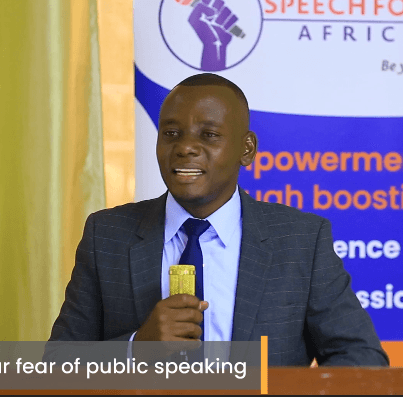The Lies That Make You Nervous in public

As a public speaking trainer, I have worked with countless individuals, students, professionals, even CEOs who struggle with stage fright and nervousness. When I ask them why they fear public speaking, their responses are often the same:
- “I have to be naturally good at it.”
- “People will judge me harshly.”
- “If I make a mistake, I’ll look foolish.”
- “Only extroverts can be great speakers.”
These fears are not based on truth, they are misconceptions that keep people trapped in fear.
If you’ve ever felt anxious about speaking in front of others, I want you to know something: what makes you nervous is not your ability, it’s the false beliefs you have been told about public speaking.
Let’s break down these myths and misconceptions so that you can finally step onto the stage with confidence.
Myth 1: “Great Speakers Are Born, Not Made”
The Truth: No one is born a great speaker, public speaking is a skill, not a talent.
I once trained a software engineer who was brilliant at his job but terrified of speaking in meetings. He told me, “I’m just not like those people who speak so naturally.” When I asked him if he was born knowing how to code, he laughed and said, “Of course not, I learned it!”
Public speaking is the same. You are not born with it, you learn, practice, and improve. Even the world’s best speakers, from Barack Obama to Oprah Winfrey, were once nervous beginners.
📌 What to do instead: Start seeing public speaking like any other skill, the more you practice, the better you become.
Myth 2: “If I Feel Nervous, I Will Fail”
The Truth: Feeling nervous is completely normal, and even professional speakers experience it!
A recent study by the National Institute of Mental Health found that about 77% of people experience anxiety about public speaking. That means even confident, successful speakers feel nervous but they have learnt to manage it instead of letting it control them.
I remember working with a university professor who had years of teaching experience but still got shaky hands and a dry mouth before big presentations. He thought it meant he wasn’t a good speaker, until I told him that even TED Talk speakers admit to feeling nervous before going on stage.
📌 What to do instead: Instead of fighting nervousness, embrace it as energy. Take deep breaths, slow down, and remind yourself: nerves mean you care.

Myth 3: “I Must Be Perfect or People Will Judge Me”
The Truth: Audiences are not waiting for you to fail, they are rooting for you!
Many people believe that if they make a mistake, everyone will laugh or think they are incompetent. But let’s be honest, have you ever watched a speaker make a small mistake and thought, “Wow, they are terrible”? Probably not! In fact, when a speaker recovers from a mistake with confidence, the audience respects them even more.
I once coached a business executive, this guy learnt the idea of converting nervousness to positive energy, one time, he froze mid-presentation. Instead of panicking, he smiled and said, “Looks like my brain took a coffee break, let’s continue!” The audience laughed, and the tension disappeared.
📌 What to do instead: Focus on connection, not perfection. If you make a mistake, breathe, smile, and move on.
Myth 4: “Only Extroverts Can Be Great Speakers”
The Truth: Some of the best speakers in history are introverts!
People assume that public speaking is only for loud, outgoing personalities, but great communication is about clarity, not personality. In fact, many powerful leaders including Bill Gates, Elon Musk, and Mahatma Gandhi are introverts.
One of my best students was a shy, quiet accountant who believed she would never be a strong speaker. After learning to use her natural calmness and thoughtfulness as strengths, she became one of the most persuasive speakers in her company, without pretending to be someone she wasn’t.
📌 What to do instead: If you’re an introvert, embrace your natural strengths. Use a calm, composed tone. Your quiet confidence can be just as powerful as loud charisma.
Myth 5: “Public Speaking Is Only for People in Leadership or Sales”
The Truth: Everyone needs public speaking skills, whether in a meeting, a classroom, or even a casual conversation.
One of my students, a doctor once said, “I don’t need public speaking, I work with patients, not audiences.” But then I told him that explaining medical procedures clearly, reassuring nervous patients, and leading team meetings were all forms of public speaking.
📌 What to do instead: Recognize that public speaking is not just about giving speeches, it’s about communicating clearly and confidently in everyday situations.
Overcoming Your Fear Starts with Changing Your Mindset
What holds most people back from public speaking isn’t a lack of ability, it’s a set of false beliefs.
- You don’t have to be born a speaker. You can learn.
- You don’t have to be fearless. You just need to manage your nerves.
- You don’t have to be perfect. You just need to connect with your audience.
The next time you feel nervous about speaking, remember that the fears in your head are myths, not reality.
As Mark Twain once said, “Courage is resistance to fear, mastery of fear, not absence of fear.”
It’s time to let go of the myths and step into the confident speaker you were meant to be.
Have you ever believed one of these myths? Share your thoughts in the comments! Let’s break the fear together. If you need more guidance on how to improve your public speaking skills and end your nervousness, contact me.
[…] these strategies be your foundation. And when in doubt, revisit my latest post “speaking like a leader for more…
[…] Here is yet another transformative post you must not miss. Speaking Like a Leader: How to command and impact…
[…] teacher and public speech trainer, I have seen firsthand how parental involvement or lack thereof affects children’s academic performance…
[…] (For customised teacher sessions on confidence building, contact us) […]
[…] Neglecting confidence-building in children leads to missed opportunities, low self-esteem, career limitations, and a lasting fear of public speaking.…

I now know países are key. They also help to calm you down and get yourself collected in the event…

This leaves me tearing looking at its reality. This is exactly what is happening but thank you for sharing and…

Thank you so much Tr Arthur Indeed, investing in these invaluable skills is essential. Personally, I attended the training with…

Thank you Faith. We shall keep on talking until it lands
- The Magic Behind Pauses in Public SpeakingIntroduction: Why Pauses Matter More Than Words If you think great public speakers are only defined by their words, think again. As a certified public speech trainer with over 19 years of experience, I’ve learned that the magic behind pauses in public speaking often outweighs the power of eloquence. It’s not just what you say,… Read more: The Magic Behind Pauses in Public Speaking
- Mastering The Art Of Public Speaking For ProfessionalsIntroduction: Why Public Speaking Still Reigns Supreme In today’s fast-paced professional world, communication is everything. Whether you’re pitching a new idea, presenting quarterly results, or addressing a room full of stakeholders, mastering the art of public speaking can elevate your credibility and influence. As a certified public speech trainer and seasoned teacher, I’ve worked with… Read more: Mastering The Art Of Public Speaking For Professionals
- The Seven Essential Public Speaking Strategies You Must KnowPublic speaking strategies can make or break your success as a communicator. Whether you’re delivering a speech in school, at work, or on a big stage, how you present your ideas matters just as much as the ideas themselves. As a certified public speech trainer, I’ve helped hundreds of people overcome fear, organize their thoughts,… Read more: The Seven Essential Public Speaking Strategies You Must Know
- Overcoming Fear of Forgetting What to Say in Public SpeakingPublic speaking can be embarrassing, especially when the fear of forgetting what to say takes over. Many speakers experience this anxiety, but the good news is that it can be managed and overcome. Whether you’re presenting at a conference, giving a speech in class, or speaking at an important event, you can develop strategies to… Read more: Overcoming Fear of Forgetting What to Say in Public Speaking
- Speaking Like a Leader: How to Command and Impact Any AudienceIntroduction Public speaking is not just about standing in front of people and delivering words; it’s about commanding attention, influencing minds, and leaving a lasting impact. The best leaders don’t just talk, they inspire action. But how do they do it? Is it a natural talent, or can it be learned? As a public speech… Read more: Speaking Like a Leader: How to Command and Impact Any Audience
- Common Public Speaking Mistakes and How to Avoid ThemPublic speaking is an essential skill for personal, academic, and professional growth. Yet, many speakers struggle with confidence, delivery, and audience engagement. Whether you’re a student, teacher, or corporate professional, understanding common public speaking mistakes can significantly improve your effectiveness. As a professional teacher and public speech trainer, I have seen how poor public speaking… Read more: Common Public Speaking Mistakes and How to Avoid Them
- The Joint Effort of Schools and Parents in a Child’s AcademicsThe Power of Collaboration in Education Many parents believe that their role in their child’s education ends at paying school fees, providing school supplies, and attending end-of-term meetings. However, a child’s academic journey requires more than financial investment, it demands emotional, intellectual, and moral support. Schools and parents must work together to nurture a confident… Read more: The Joint Effort of Schools and Parents in a Child’s Academics
- The Hidden Barrier to Academic Success: ConfidenceThe Hidden Barrier to Academic Success: Confidence As a professional teacher and public speech trainer with 19 years of experience, I have worked with students from different backgrounds, learning abilities, and confidence levels. Over the years, one undeniable truth has stood out, confidence is just as crucial as intelligence when it comes to academic success.… Read more: The Hidden Barrier to Academic Success: Confidence
- Beyond the Cane: Alternatives to corporal punishments in children.Positive discipline, a tool to building confidence I have spent 19 years as a professional teacher and public speech trainer, helping children, adults, and corporate professionals gain confidence and self-expression. Over the years, I have witnessed firsthand the devastating effects of corporal punishment on children’s self-esteem, both at home and in schools. I have worked… Read more: Beyond the Cane: Alternatives to corporal punishments in children.
- The Systematic Neglect of “Slow Learners” in Favour of Gifted Ones.Bridging the Gap Between Gifted and Less Gifted Learners In my years as an educator and public speech trainer, I have seen a troubling pattern unfold in many schools: The celebration of gifted students while the less gifted or slow learners are sidelined. Schools take pride in showcasing their best and brightest, those who grasp… Read more: The Systematic Neglect of “Slow Learners” in Favour of Gifted Ones.



[…] of my recent posts, “The Seven Things You Must Know About Public Speaking”, delves deeper into the mindset required…